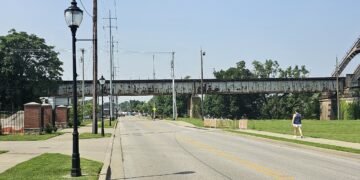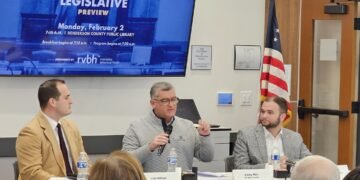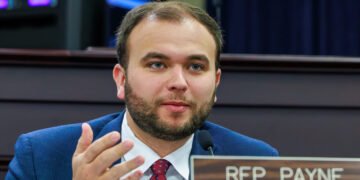Courtesy of Kentucky Lantern
GRAVES COUNTY—Al Chandler, superintendent of Northside Baptist Christian School, the only private school in Graves County, plans to vote for Amendment 2—but not because he thinks his local public schools are failing students or families.
“We really have wonderful, wonderful schools. Mayfield and Graves (County) both in our county, are just great schools,” Chandler said. “That really makes the conversation even more muddied if we bring it into our region up here because of the quality of choices that we have.”
Kentucky is in a minority of states that has no charter schools or voucher programs to help families pay for private schools. That could change if voters on Nov. 5 approve Amendment 2, which would lower barriers in Kentucky’s Constitution that have blocked a charter school law and tax credits supporting private school tuition.
If voters approve the amendment, which was put on the ballot by Republican lawmakers, Kentucky’s legislature for the first time would be free to fund private schools with public money, though the amendment offers no specifics on what form state support would take.
That prospect worries educators and school officials in Graves County who fear public education would be weakened if state funding is diverted into private schools.
“It’ll hurt us financially. I mean, it will,” said Janet Throgmorton, the principal of Graves County High School who’s driven school buses across the rural county spanning 566 square miles, the seventh-largest in the state. She took on regular bus driving duties during the pandemic as the district, like others, faced a driver shortage. “They’re not thinking about a school district that travels thousands and thousands of miles because our county is so large and rural.”
Amendment 2 was a hot topic of debate on stage at the annual Fancy Farm Picnic, but interviews with parents the day before the early August event suggest educating voters will be a challenge for both sides. Also, parents, at least in Graves County, are bullish on their public schools.
“This is just such a great school and they offer so many things, essentially for free,” said Brooke Lowry, whose 14-year-old son Vin starts his freshman year at Graves County High School this week. “He can graduate and have a welding certificate and go get a job automatically out of high school.”
Lowry, who lives in the Mayfield Independent Schools district but sends her son to the county schools, wasn’t aware of Amendment 2 and was not sure about the idea of allowing public funding to go to non-public schools.
Whether rural support for public schools will translate into opposition to the amendment is uncertain, but it’s the goal of the public education advocacy coalition Protect Our Schools KY and the Kentucky Education Association, the state’s largest union representing teachers. KEA members in red shirts waved signs among the throngs of onlookers at the Fancy Farm Picnic.
Chandler, lead pastor of Northside Baptist Church in Mayfield, and the Republican lawmakers who represent West Kentucky in Frankfort, talk about the need for more educational “choice,” not necessarily in their hometowns but in other Kentucky places that have, in Chandler’s words, “a lot more controversy, a lot more issues.”
Sen. Jason Howell, R-Murray, who voted to put Amendment 2 on the ballot, told a breakfast crowd before the Fancy Farm picnic that “KEA and the Jefferson County Teachers Association hate this amendment.” Howell also said West Kentucky “has really good school systems.” Rep. Richard Heath, R-Mayfield, told the Lantern the focus of the amendment is larger school districts like Jefferson County and less so West Kentucky.
The state’s largest school district, Jefferson County Public Schools, has been a target of GOP criticism for years, most recently for a transportation debacle that saw school buses running hours behind schedule in getting kids home at the beginning of school last year.
Chandler, who was a Graves County public elementary school teacher and had homeschooled his kids before leading his Christian school, said more funding doesn’t always fix issues a school district is grappling with.
Supporters of the amendment, including the conservative advocacy group Americans for Prosperity, have argued public school funding should be controlled by families.
“Does it hurt them by not being able to provide more resources to Jefferson and Fayette? You know, maybe,” said Chandler, referencing the amendment’s possible effects on the state’s two largest school districts. “Sometimes there needs to be some other options to bring out maybe what that community’s strengths are.”
Funding worries amid a return to normalcy
Any disruption in state education funding could be acutely felt in Mayfield and Graves County, which are still recovering from natural disasters that damaged property and took lives, including a record rainfall event that caused damaging flooding last year and a catastrophic tornado that tore through Mayfield in 2021.
But signs of regularity are returning to the county of about 36,000 people. Throgmorton, the high school principal beginning her 29th year in public education, said some students who lost homes are now living in newly rebuilt fully furnished ones. And the new stop lights are working.
“Have you ever been thankful for a stoplight?” Throgmorton said. “It feels normal. Like that’s the way it’s supposed to be.”
Funding is a constant concern for educators, she said, especially with costs rising because of inflation. Salaries are the biggest item in school budgets. But schools also must buy toiletries, pay electricity and water bills, fuel school buses and provide students laptops—including when they occasionally get broken.
“I always tell people that when they say, “Where’s all the money go? They get all these millions of dollars,’” Throgmorton said. “All those expenses you have at home, we have here.”
The GOP-dominated state legislature this year did increase funding to school districts, though not as much as Democratic Gov. Andy Beshear had called for. Instead of giving the direct 11% raise Beshear had proposed, the legislature encouraged public school districts to raise teacher salaries with the increased school funding. Graves County Schools and Mayfield Independent Schools both gave a 3% raise to their teachers.
As fall campaigns begin and debate heats up around the amendment, Throgmorton raises questions: Where would the public funding come from to support private schools? Would transportation costs be covered for private schools since some students’ families don’t have reliable transportation? Would private schools that receive public funds be held to the same educational standards and accountability as public schools?
Jennifer Ginn, a Kentucky Department of Education spokesperson, said standards set for public schools that private schools are not subject to include state assessment and accountability and high school graduation requirements. The leader of a private school determines curriculum, Ginn said, while a public school district superintendent has control over curriculum.
Throgmorton also joins critics who say Amendment 2’s ballot language is potentially deceiving; the preamble asks voters whether “to give parents choices in educational opportunities for their children.”
“Why are we making this decision when you haven’t even laid out a plan about what that’s going to look like?” Throgmorton said. “Because people may vote, ‘Yes, give everybody school choice.’ And then they may be just mortified at what they’re going to do and how that’s going to look.”
Republican lawmakers have said little about what comes next, that approval of Amendment 2 just provides the legislature with the option to publicly fund private schools. Rep. Suzanne Miles, R-Owensboro, the primary sponsor of the bill that put Amendment 2 on the ballot, spoke on the Fancy Farm stage. She said accountability concerns surrounding public money for nonpublic schools could be addressed in future legislation—but only if the amendment passes this fall.
The left-leaning think tank Kentucky Center for Economic Policy in a July report found if Kentucky were to set up a school voucher program similar to the program in Florida, it would cost Kentucky over $1 billion. The think tank also estimates at least 65% of vouchers used in other states subsidize parents already paying private school tuition. Some religious schools in Florida have seen a surge of enrollment thanks to the state’s school voucher program, while other states have seen lawsuits over whether public funding should go to religious schools.
The think tank researchers wrote Kentucky’s poorest school districts would be hit hardest if public funding is diverted from public schools, considering that some of the poorest school districts rely the most on state dollars. Some Eastern Kentucky Republicans joined with Democrats earlier this year in voting against the legislation that put Amendment 2 on the ballot, also concerned about harm to their public schools facing disaster recovery challenges from floods.
When asked about that report and opposition from some in the GOP, Miles said there isn’t “a voucher in this amendment” and that “opponents are going to make up things” about the amendment.
“Any parent that wants to choose right now, they choose. If they can afford to choose, they choose. There’s a lot of children out there and parents that can’t choose,” Miles said. “If every parent and child is happy in Graves County Schools, it would be exactly the way it is.”
Chandler, the private school principal, said he understood the “fear” of public schools potentially losing funding, but he doesn’t see that happening in West Kentucky. He said he doesn’t think his Christian school would “benefit greatly” if the amendment passes.
He shared an anecdote from when he was leading a homeschooling co-op, mentioning he had conversations with a local public school official who was interested in helping homeschooling families with curriculum. But one of the primary reasons families were homeschooling, he said, was because they “didn’t feel comfortable with what was being taught” in public schools.
“It seems maybe divisive, but yet at the same time it’s kind of a parental priority to do what’s best for your child and your family,” Chandler said.
A community bonded through education
As the Fancy Farm Picnic weekend unfolded, the connections people had with local schools in Graves County were apparent, whether it was sporting clothing with school colors while walking around the picnic grounds to the people who put on the picnic themselves.
Chandler, a Republican, gave a prayer the morning of the Republican breakfast ahead of the Fancy Farm Picnic speeches. Throgmorton has also attended the picnic for decades having previously been the Fancy Farm Elementary School principal for 26 years. The school was used as a resource hub in the immediate aftermath of the EF-4 tornado that devastated Mayfield.
Angela Richards, 52, was sporting a Fancy Farm Picnic shirt the day before the picnic as she and her 14-year-old son Noah walked out of Graves County High School finishing up orientation for incoming freshmen. Only minor complaints came from Noah as she asked to get his picture in front of the school.
“We may be a small town, but we’re a very passionate town,” she said with a laugh when talking about Fancy Farm. He attended Fancy Farm Elementary, so Throgmorton will be his principal for a second time.
Richards says having six elementary schools across the sprawling county—and the sense of community the schools build—is an asset. Even if students are funneled into the single high school, “you still have your grassroots from that elementary school.”
“It’s neat that I think that you can grow up in those smaller communities and be more of a small hometown feel like Fancy Farm,” Richards said.
Richards, who teaches at a beauty school in Paducah and has been a substitute teacher in Graves County, also was unaware of Amendment 2 and unsure how she felt about public funds going to private schools. Some teachers are working two jobs to make a living or buying school supplies on their own, she said.
“It better not be taken away from my child,” Richards said. “There’s only so much money that the state provides that can be passed around. So if that’s going to make it worse, that would be something that I would totally be against.”
Kentucky Lantern is part of States Newsroom, the nation’s largest state-focused nonprofit news organization.



















